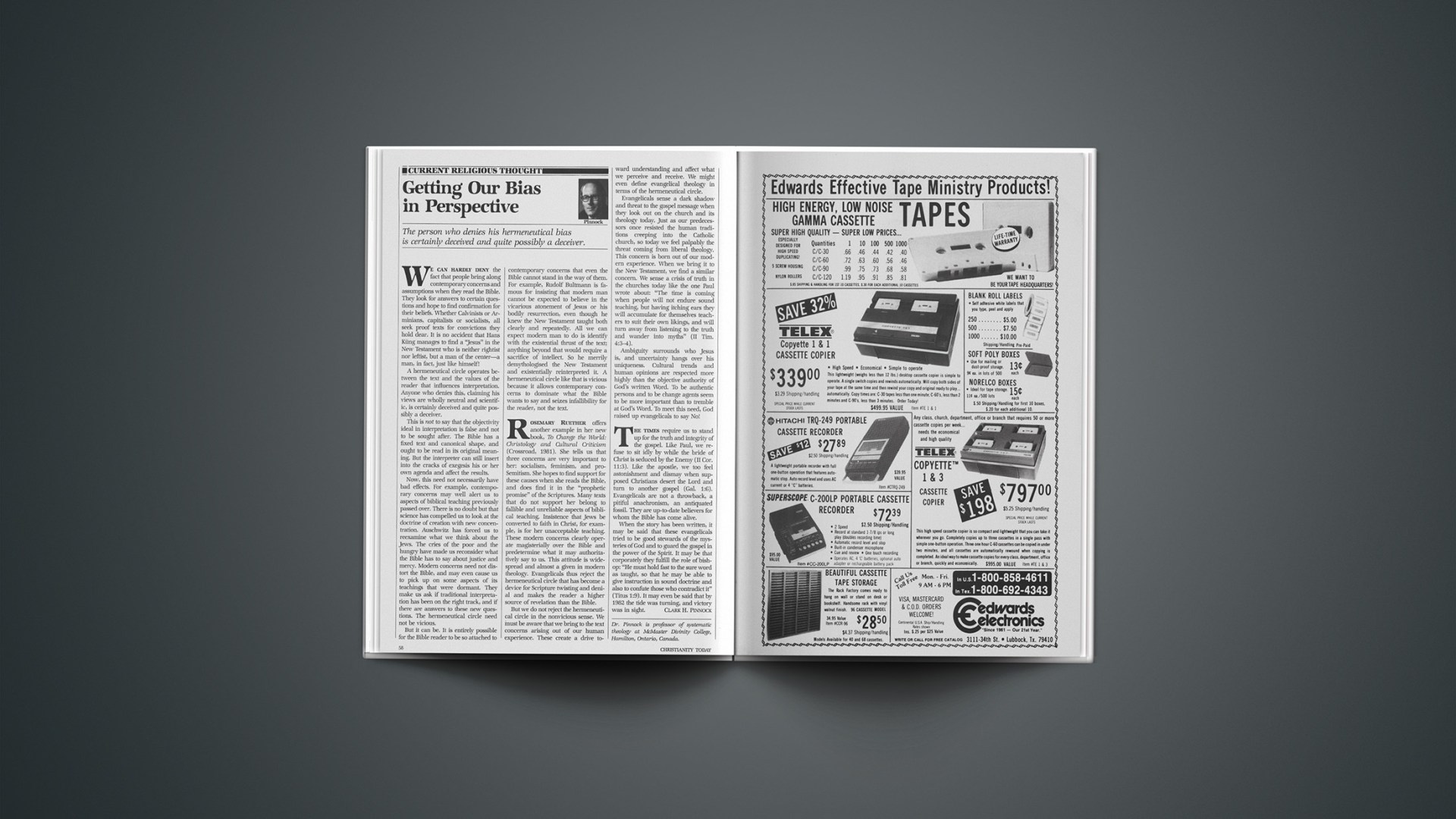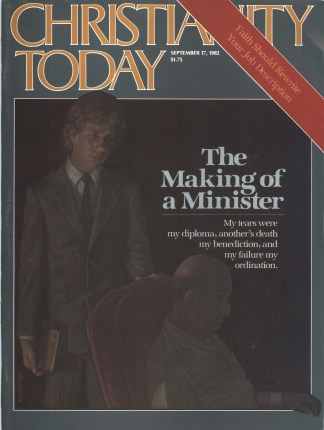We can hardly deny the fact that people bring along contemporary concerns and assumptions when they read the Bible. They look for answers to certain questions and hope to find confirmation for their beliefs. Whether Calvinists or Arminians, capitalists or socialists, all seek proof texts for convictions they hold dear. It is no accident that Hans Küng manages to find a “Jesus” in the New Testament who is neither rightist nor leftist, but a man of the center—a man, in fact, just like himself!
A hermeneutical circle operates between the text and the values of the reader that influences interpretation. Anyone who denies this, claiming his views are wholly neutral and scientific, is certainly deceived and quite possibly a deceiver.
This is not to say that the objectivity ideal in interpretation is false and not to be sought after. The Bible has a fixed text and canonical shape, and ought to be read in its original meaning. But the interpreter can still insert into the cracks of exegesis his or her own agenda and affect the results.
Now, this need not necessarily have bad effects. For example, contemporary concerns may well alert us to aspects of biblical teaching previously passed over. There is no doubt but that science has compelled us to look at the doctrine of creation with new concentration. Auschwitz has forced us to reexamine what we think about the Jews. The cries of the poor and the hungry have made us reconsider what the Bible has to say about justice and mercy. Modern concerns need not distort the Bible, and may even cause us to pick up on some aspects of its teachings that were dormant. They make us ask if traditional interpretation has been on the right track, and if there are answers to these new questions. The hermeneutical circle need not be vicious.
But it can be. It is entirely possible for the Bible reader to be so attached to contemporary concerns that even the Bible cannot stand in the way of them. For example, Rudolf Bultmann is famous for insisting that modern man cannot be expected to believe in the vicarious atonement of Jesus or his bodily resurrection, even though he knew the New Testament taught both clearly and repeatedly. All we can expect modern man to do is identify with the existential thrust of the text; anything beyond that would require a sacrifice of intellect. So he merrily demythologised the New Testament and existentially reinterpreted it. A hermeneutical circle like that is vicious because it allows contemporary concerns to dominate what the Bible wants to say and seizes infallibility for the reader, not the text.
Rosemary Ruether offers another example in her new book, To Change the World: Christology and Cultural Criticism (Crossroad, 1981). She tells us that three concerns are very important to her: socialism, feminism, and pro-Semitism. She hopes to find support for these causes when she reads the Bible, and does find it in the “prophetic promise” of the Scriptures. Many texts that do not support her belong to fallible and unreliable aspects of biblical teaching. Insistence that Jews be converted to faith in Christ, for example, is for her unacceptable teaching. These modern concerns clearly operate magisterially over the Bible and predetermine what it may authoritatively say to us. This attitude is widespread and almost a given in modern theology. Evangelicals thus reject the hermeneutical circle that has become a device for Scripture twisting and denial and makes the reader a higher source of revelation than the Bible.
But we do not reject the hermeneutical circle in the nonvicious sense. We must be aware that we bring to the text concerns arising out of our human experience. These create a drive toward understanding and affect what we perceive and receive. We might even define evangelical theology in terms of the hermeneutical circle.
Evangelicals sense a dark shadow and threat to the gospel message when they look out on the church and its theology today. Just as our predecessors once resisted the human traditions creeping into the Catholic church, so today we feel palpably the threat coming from liberal theology. This concern is born out of our modern experience. When we bring it to the New Testament, we find a similar concern. We sense a crisis of truth in the churches today like the one Paul wrote about: “The time is coming when people will not endure sound teaching, but having itching ears they will accumulate for themselves teachers to suit their own likings, and will turn away from listening to the truth and wander into myths” (2 Tim. 4:3–4).
Ambiguity surrounds who Jesus is, and uncertainty hangs over his uniqueness. Cultural trends and human opinions are respected more highly than the objective authority of God’s written Word. To be authentic persons and to be change agents seem to be more important than to tremble at God’s Word. To meet this need, God raised up evangelicals to say No!
The times require us to stand up for the truth and integrity of the gospel. Like Paul, we refuse to sit idly by while the bride of Christ is seduced by the Enemy (2 Cor. 11:3). Like the apostle, we too feel astonishment and dismay when supposed Christians desert the Lord and turn to another gospel (Gal. 1:6). Evangelicals are not a throwback, a pitiful anachronism, an antiquated fossil. They are up-to-date believers for whom the Bible has come alive.
When the story has been written, it may be said that these evangelicals tried to be good stewards of the mysteries of God and to guard the gospel in the power of the Spirit. It may be that corporately they fulfill the role of bishop: “He must hold fast to the sure word as taught, so that he may be able to give instruction in sound doctrine and also to confute those who contradict it” (Titus 1:9). It may even be said that by 1982 the tide was turning, and victory was in sight.
Dr. Pinnock is professor of systematic theology at McMaster Divinity College, Hamilton, Ontario, Canada.










